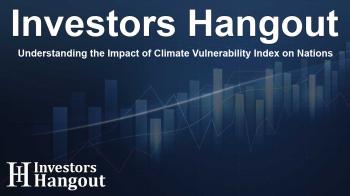Understanding the Impact of Climate Vulnerability Index on Nations

New Index Highlights Global Vulnerability to Climate Shock
The Columbia Climate School has introduced a vital tool that maps out the vulnerabilities of countries around the globe to climate-related shocks. This index identifies 65 nations as 'Red Zone' states, which are particularly susceptible to various climate scenarios that could threaten their stability and security. The aim of this study is to illuminate the urgent need for better assessments of risk and more effective funding allocation to address such vulnerabilities.
Identifying Vulnerable Regions
Recent findings reveal that 43 of the most affected nations are from Sub-Saharan Africa, with additional countries in Latin America, the Caribbean, Asia-Pacific, the Middle East, and Europe also facing significant risks. This comprehensive approach acknowledges that while climate hazards are intensifying, many countries are still struggling under heavy debt burdens that limit their ability to access the necessary funding for disaster preparedness and recovery.
A Comprehensive Look at Climate Risks
The Climate Finance Vulnerability Index integrates various risks—from natural disasters like cyclones and floods to geopolitical factors such as conflict. By doing so, it paints a clear picture of how countries are positioned to respond to climate impacts considering their financial capabilities. The index serves to bridge the gap between risk evaluation and funding, ensuring that support is directed towards those countries most in need.
Real Consequences of Climate Change
Predictions indicate that climate-related phenomena could result in over 14.5 million fatalities and $12.5 trillion in losses globally by 2050. Such alarming forecasts emphasize the urgent need for robust financial measures to enhance resilience against these challenges. The United Nations projects that the annual financial gap for climate adaptation could reach as high as $387 billion, leaving many nations unprepared for the realities of climate change.
Key Features of the Index
This index includes several innovative features that allow stakeholders to customize and filter data according to different scenarios. Users can examine outcomes based on timelines such as 2050 and 2080, as well as varying projections for climate development. This dual approach provides insights into long-term risks, allowing policymakers to make informed decisions about where to allocate resources effectively.
Focus on Under-served Regions
Beyond Africa, the index also highlights critical findings about vulnerable nations in the Asia-Pacific region, which includes over 520 million people, as well as several at-risk countries in Latin America and the Caribbean. In total, the insights provided by the Climate Finance Vulnerability Index can help donor organizations better understand where their support is most urgently needed, enabling them to make more targeted investments.
Assessing Global Preparedness
The findings indicate that countries with stronger capacities to respond to climate shocks typically belong to the OECD. These nations, including Denmark, Switzerland, and the United States, have demonstrated higher resilience, partly thanks to their developed financial markets and governance structures. This contrasts sharply with nations in the Red Zone, where access to capital remains a significant challenge.
Collaborative Efforts for Climate Resilience
Developed jointly by experts from the Columbia Climate School and affiliated organizations, the index calls for collaborative responses to the escalating climate crisis. Its comprehensive data integration considers multiple factors that influence countries' readiness for climate impacts, including debt sustainability and institutional robustness. The index thus provides a roadmap for enhancing climate finance strategies.
Global Calls for Action
Various leaders have emphasized the significance of the CliF Vulnerability Index in shaping future climate finance initiatives. It has sparked discussions about how donors can pivot their support towards nations facing critical financial constraints. As the climate crisis intensifies, concerted action and innovation are necessary to foster resilience in the most vulnerable nations.
Frequently Asked Questions
What is the Climate Finance Vulnerability Index?
The Climate Finance Vulnerability Index is a tool developed to identify nations that are most vulnerable to climate shocks while assessing their access to financial resources for mitigation and recovery.
How does the index categorize at-risk countries?
The index categorizes countries into different risk zones—specifically identifying 65 'Red Zone' nations that are highly susceptible to climate impacts and increasingly financial crises.
Why is the index important for funding allocation?
This index helps direct vital funding towards countries that are at greatest risk, ensuring resources are allocated efficiently to tackle urgent climate issues.
What are the projected impacts of climate change by 2050?
It is estimated that climate change could lead to 14.5 million deaths and over $12.5 trillion in economic losses worldwide by 2050 if sufficient measures are not taken.
How can stakeholders utilize this index?
Stakeholders can filter scenarios using the index to see how nations might be impacted under different climate conditions, aiding in strategic planning and resource allocation.
About The Author
Contact Caleb Price privately here. Or send an email with ATTN: Caleb Price as the subject to contact@investorshangout.com.
About Investors Hangout
Investors Hangout is a leading online stock forum for financial discussion and learning, offering a wide range of free tools and resources. It draws in traders of all levels, who exchange market knowledge, investigate trading tactics, and keep an eye on industry developments in real time. Featuring financial articles, stock message boards, quotes, charts, company profiles, and live news updates. Through cooperative learning and a wealth of informational resources, it helps users from novices creating their first portfolios to experts honing their techniques. Join Investors Hangout today: https://investorshangout.com/
The content of this article is based on factual, publicly available information and does not represent legal, financial, or investment advice. Investors Hangout does not offer financial advice, and the author is not a licensed financial advisor. Consult a qualified advisor before making any financial or investment decisions based on this article. This article should not be considered advice to purchase, sell, or hold any securities or other investments. If any of the material provided here is inaccurate, please contact us for corrections.

